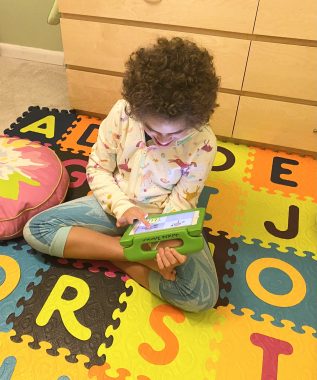My Angel Gets Her Voice With an AAC Device
It’s never too late for an Angel to find her voice.
This past summer, Juliana, 11, finally got an iPad as her dedicated augmentative and alternative communication (AAC) device.
Getting Juliana her own tablet for communicating has been on my list of things to do for a while, after a former speech specialist recommended I get a tablet for her to talk with, and I saw how well she was doing using an iPad. And she is no stranger to using a tablet for communication; she used My First AAC from her first sessions with her early intervention speech therapist. She also uses a Go Talk Now device at school.
Having a means to communicate is a lifeline for Angels who are considered nonverbal, and, of course alternative communication may be achieved through sign language, pictures, or with a device. As part of AAC Awareness Month, Apraxia Kids is accepting applications to win a free speech tablet, and is also offering a free webinar on strategies for apraxia.
Choosing for now and later
Selecting the communication app that Juliana would use on her new AAC device took a little bit of work. There are so many choices and it’s easy to get caught up in the process of researching software, but not every app I found was suitable for Juliana’s needs or her current skill level.
To make the process easier, I visited some trusted sites, and sought out recommendations from people I know. Instead of falling into a procrastination trap, I decided to keep the process simple, narrowing my list to three finalists, watching videos on each one, and then looking at tutorials about how easily I could set it up and how Juliana could use it.

Juliana uses the dedicated communication tablet that she got over the summer to talk about family members. (Photo by Sabrina L. Johnson)
Finally, I chose TouchChat because it seems like the best fit for Juliana now and it will still be useful for her as her skills improve.
It’s never too early to begin communicating
I didn’t always realize the importance of using AAC devices. Years ago, I remember watching Juliana practicing choices on an iPad with her speech therapist. I wondered why it was so important to have her work toward communicating so early. But now I would say to any parent considering alternative communication for their Angels that there is no time like the present. I would scream the advice from the rooftops if I could. That’s how important AAC is for our Angels.
Managing an AAC device or using any AAC effectively takes time and a whole lot of practice. Every child learns at her own pace, but she won’t learn if she’s not given the opportunity. I am so grateful to our speech therapist for helping me see this.
Angels are more than capable of communicating. Beginning alternative communication as early as possible provides more time for mastery. We progressed with Juliana from picture cards to a device, but she also learned to use sign language when she was about 2.
“I want to eat,” Juliana told me the other morning as I was moving too slowly to get breakfast. “Yes, Mommy is gonna get breakfast now,” I replied. Juliana beamed with pride at her declaration and my acknowledgment.
It’s her sister’s recorded voice that vocalizes Juliana’s selections on her iPad. But, it’s Juliana’s thoughts that come to life with the push of a button. I’m so glad I didn’t wait any longer to expand the reach of her voice.
I know she has so much to say. And I just can’t wait to hear it.
***
Note: Angelman Syndrome News is strictly a news and information website about the disease. It does not provide medical advice, diagnosis, or treatment. This content is not intended to be a substitute for professional medical advice, diagnosis, or treatment. Always seek the advice of your physician or other qualified health provider with any questions you may have regarding a medical condition. Never disregard professional medical advice or delay in seeking it because of something you have read on this website. The opinions expressed in this column are not those of Angelman Syndrome News, or its parent company, Bionews, and are intended to spark discussion about issues pertaining to Angelman syndrome.








Leave a comment
Fill in the required fields to post. Your email address will not be published.